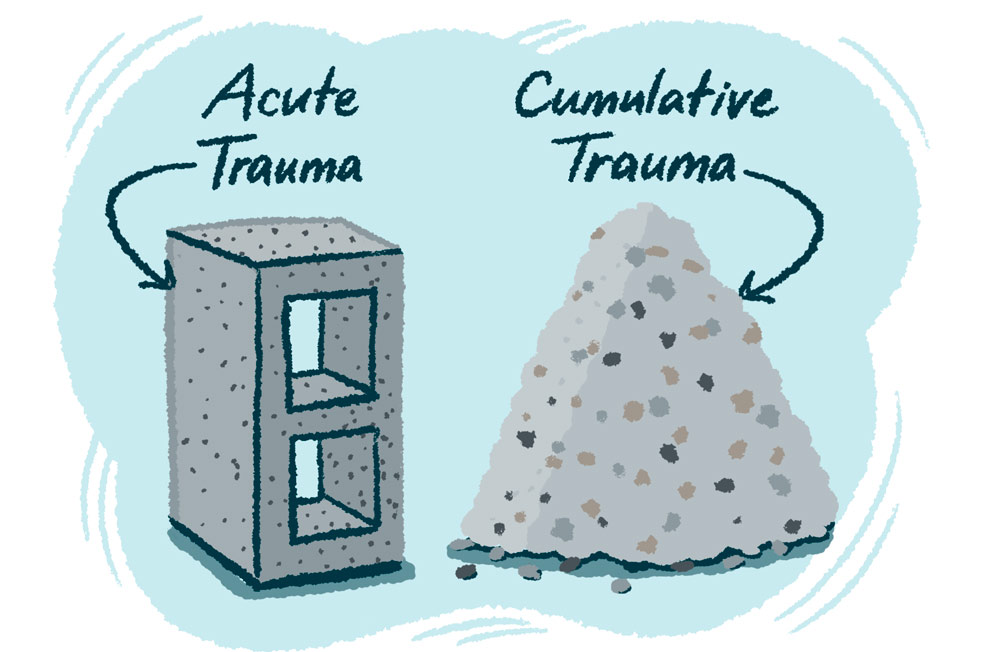
Types of Trauma
People tend to think there’s only one kind of trauma: the kind that’s the result of a single horrific event, like abuse, a tragic death or a large-scale catastrophe. Of course, these incidents can be traumatic, but there are other types of trauma as well. Here are the main types of trauma you should know about:
Acute Trauma
This is the type of trauma I just mentioned—the big horrific event. Think of things like the September 11 attacks or your father’s sudden heart attack. Or experiencing abuse, physical injury, divorce, deep betrayal or any monumental moment of terror that’s now seared into your memory. It's huge, heavy and alters the course of your life.
Remember that kid with the backpack we talked about earlier? Experiencing a big traumatic event like this is the equivalent of someone dropping a cinder block in that backpack. I call this Big T trauma, but the nerd word for it is acute.
Cumulative/Chronic Trauma
There’s another type of trauma that I call Little T trauma, but in the nerd world, it’s called cumulative or chronic trauma. This is the kind of trauma that adds up over time.
Think about the things people have said to you that still rattle around in your head. The throwaway comment an ex-girlfriend made about your teeth. Hearing your dad say, “Stop crying. Suck it up,” anytime you were in pain. Coming down the stairs to comments from your mom like, “Honey, that shirt makes you look pudgy.” Or think about neglect, repeated disappointment, disapproving headshakes, and having to compete for attention with your parents’ smartphones.

A single occurrence of these situations may not hit you like a cinder block—but because everyone experiences trauma differently, it very well might. Instead, each one of these moments is like pebbles being dropped in your backpack. After a few months or years, the weight of the pebbles adds up to the weight of a cinder block. Trauma is all about the weight.
Secondary Trauma
Also known as vicarious trauma, this kind of trauma develops from being involved in the lives of other people who have experienced traumatic events. People who experience secondary trauma may include nurses, teachers, doctors, police officers, military personnel, surgeons, social workers, counselors or anyone who regularly responds to distressing situations. That also includes a dad with a special-needs child or someone caring for an elderly parent with dementia.
Living and working in the lives of people experiencing pain or distress changes the body, mind and spirit of the caregiver too. These types of people are at risk for something called compassion fatigue, where they try to protect themselves from experiencing distress by actively avoiding emotional investment in others.
Complex Trauma
Complex trauma is kind of a combination of acute and chronic trauma. It occurs when someone has experienced long-term, persistent and overwhelming hardship—like suffering ongoing abuse, growing up in a violent home, or enduring combat—especially in situations where there’s been no possibility of escape.
People who have been trapped in a series of traumatic events over a long period of time often completely lose their sense of safety and experience a variety of responses, from dissociation (more on that later) to hypervigilance (which is constantly monitoring one’s surroundings to see if there are any threats). People who experience complex trauma no longer feel safe in their relationships, their family or communal systems, or even in their own bodies.


